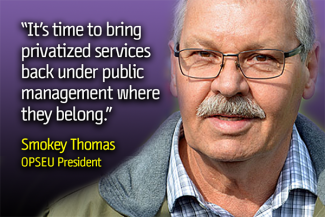EPIC FAIL AGAIN
Privatization fails us one more time

PRIVATIZATION DOESN’T HELP. The recent collapse of Carillion, a British megacontractor that plows roads and helps run the Royal Ottawa Mental Health Centre proves it—again.
The last thing a mental health centre needs is uncertainty. But the liquidation of the company that makes the food, runs the laundry, cuts the grass and fixes the building adds an extra level of anxiety to day-to-day operations there. The very thing the original private public partnership (P3) was supposed to guard against.
One dumb idea after another
P3s were all the rage with governments back in the early 2000s. The promise was the arrangement would deliver better services to the public at a lower cost by partnering up with private business and letting them make money out of the partnership. It never worked. The quality of services, their availability and reliability dropped and dropped and dropped.
But, back in 2003 the Conservative government in Ontario couldn’t wait to get into a partnership with Carillion. The partnership called for Carillon to completely rebuild the old hospital in Ottawa into the Royal Ottawa Mental Health Centre, to finance the work, to maintain the structure and provide all the housekeeping and related services.
Pension funds were tapped to put up the $100-million needed to build the new Royal Ottawa Centre. The contracts for Carillion’s services are worth about $7 million a year, plus $4 million in “flow-through” payments for things like the gas and electric bills.
The deal, and a similar one for a new general hospital in Brampton, Ontario, was groundbreaking and controversial at the time. The possibility that the private partner that does the cleaning, maintenance and food service might one day vaporize was not one of the major worries at the time. So, there is no backup plan.
Hope is not a plan
Administrators at the Royal Ottawa admit they are just keeping their fingers crossed, in the hope that some other megacorp will jump in and pick up the contract abandoned by Carillon.
Meanwhile, the Ministry of Transportation is trying to figure out what will happen with Carillion’s road-maintenance contracts. It holds eight of Ontario’s 20 maintenance contracts. They’re worth about $81 million a year.
The sudden collapse of Carillon was the final act in a story they filled with failure upon failure:
- a $500 million overrun in the design and construction of the William Osler Health Centre
- a fine of $900,000 for failing to fulfill its contractual duties in highway maintenance
- pleading guilty to illegally dumping oil and toxic paint coating
- abandoning its snowplowing operations in the Huntsville, Ontario area
Make ‘public services’ public again
There is a simple and obvious way to permanently eliminate the possibility of such epic fails says Smokey Thomas: hand the delivery of our public services back to public service workers—the ones who do it best.
Thomas is the president of the 130,000-member Ontario Public Service Employees Union (OPSEU). Many of his members did the work handed to Carillon.
“This is a clear sign that privatization doesn’t work,” says Thomas. “It’s ineffective. It’s over-priced. And as we’re learning today, it’s totally unreliable.”
“It’s time for our government to face these facts and begin bringing privatized services back under public management, where they belong,” Thomas says.
“Remember: Carillion isn’t the only large corporation providing privatized public services in Ontario,” Thomas added. “It’s time for us to look at all of those contracts and ask ourselves if privatization is worth the risk.”
- 30 -
For more information: Warren (Smokey) Thomas, 613-329-1931











Add new comment